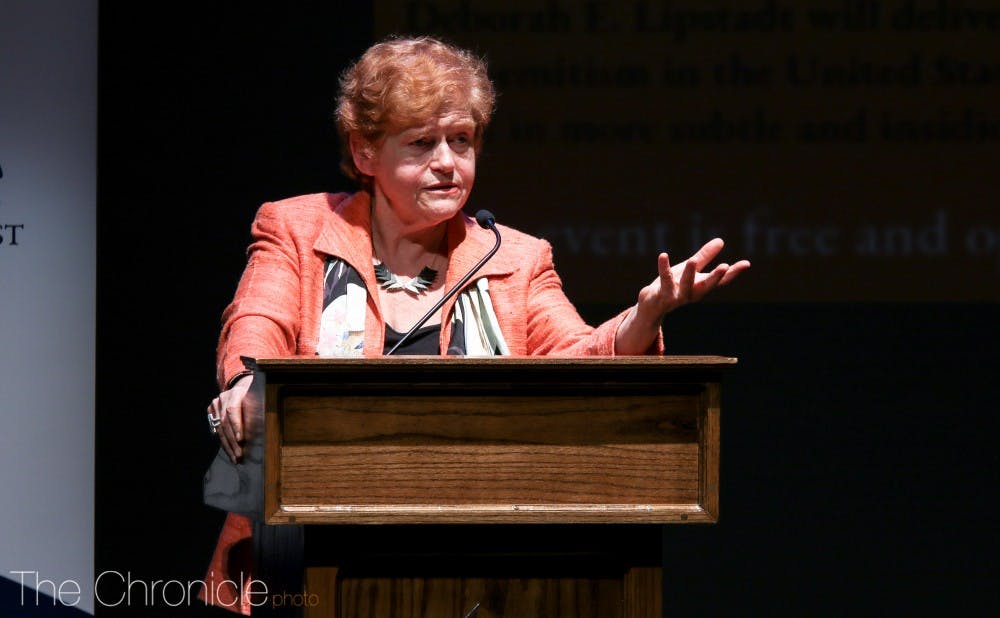Antisemitism is a complex issue with many sources and players, but historian Deborah Lipstadt is trying to making it easier for people to understand.
In her recently-published book “Antisemitism Here and Now,” Lipstadt, Dorot professor of modern Jewish history and Holocaust studies at Emory University, synthesizes how modern antisemitism is expressed. She gave a talk of the same name at Duke Monday, which nearly filled the Reynolds Theater's 608-person capacity and brought active audience participation.
“Generally, all my books are about what has been," Lipstadt said. "This is a book about what is."
She continued sending in edits to the manuscript until the last moment of publication as more murders, attacks and events of discrimination against Jews occurred. Five weeks after sending it in, 11 were killed in a shooting at a Pittsburgh synagogue in October 2018.
“As I wrote, the issue became not only more relevant, but it became more urgent,” Lipstadt said.
In light of antisemitic violence, Lipstadt knew it was important to break down the hatred and where it came from. She outlined the definition of antisemitism as easily identifiable by its structure. Known as the “longest hatred,” antisemites dislike Jews over four main issues, Lipstadt explained.
First, antisemitism comes with talk of money, either that Jews are too cheap or they make too much, Lipstadt said. Second, there is perceived intellect, what Lipstadt called a “malicious, nefarious kind of smart.” The third tenant of antisemitism is the resentment of Jews regarding their hold of power. Fourth, anti-Semitism is when people dislike Jews purely because they cannot target the source of their distrust, Lipstadt said.
“They can’t quite find them, can’t identify them, can’t see where the harm is coming from,” Lipstadt said.
In the same way that antisemitism is identifiable, so are antisemites. The “extremist” is the “Hitlerian” antisemite who is “unequivocal in their hatred of Jews and actions of violence against Jews,” Lipstadt said. These people are easy to identify. Others aren't as easy to spot, like the "dinner party" antisemite.
These sorts of people would never think of doing something blatantly harmful like displaying a swastika, but would say at dinner, “Our firm just hired a new associate, he’s Jewish but he's really honest,” Lipstadt said. They could be commonly heard saying that the Jews they know are good people, but remain distrustful of the Jewish population in general.
Lipstadt also detailed the characteristics of "clueless antisemites," which are created as a byproduct of antisemitic cultural norms.
“What's disturbing about this is that its a demonstration of how out in the ethosphere these antisemitic concepts are and how they’ve become absorbed by people without even fully recognizing that they’re antisemitic,” Lipstadt said.
Finally, for Lipstadt, the antisemitic enabler emboldens and validates antisemites. Lipstadt sees this as particularly prevalent in politics on both sides of the aisle. Although from Lipstadt's point of view, President Donald Trump seems proud of his Jewish family, his comments have been used by antisemites as supporting evidence for their cause.
“Nearly every far-right extremist believes that President Trump agrees with them,” she said. Lipstadt also used democratic socialist Jeremy Corbyn, leader of the British Labour Party, as an example of an enabler. She said that left-leaning people see the world through ethnicity and class.
“When they look at a Jew, they see someone who is white and wealthy,” Lipstadt said. “The person on the left looks at the Jew and says, ‘You could not possibly be a victim of antisemitism.’ They’re myopic.”
This myopic view is the same criticism Lipstadt had of anti-Israel sentiment. Although people can certainly point out the faults with Israel’s dealing in the West Bank and Gaza Strip, those criticisms become antisemitic when they are not taken into context, she said.
“Criticism of Israeli policies is not antisemitism,” Lipstadt said. “What is antisemitism is when you take a myopic view of all human rights issues in the world and the only one you see is Israel. Or when you take a myopic view of the situation and see fault only on one side. Or when someone argues that ‘Israel has lost its right to exist because it was founded in the sin of the oppression of other people.’”
Lipstadt fears that modern antisemitism, specifically on college campuses, will cause young Jews to go “back into the closet” and attempt to hide their identity to fit in.
“We must become the unwelcome guests at the dinner party,” Lipstadt said. “When we hear someone saying something, whether it is antisemitic, racist, Islamophobic, sexist, homophobic, we can't sit silently by and do nothing. Not to change the mind of the person who’s making the comments because that might be a useless task, but to telegraph the message that this is something we will not tolerate.”
Get The Chronicle straight to your inbox
Signup for our weekly newsletter. Cancel at any time.

Maria Morrison is a Trinity senior and a digital strategy director for The Chronicle's 117th volume. She was previously managing editor for Volume 116.

